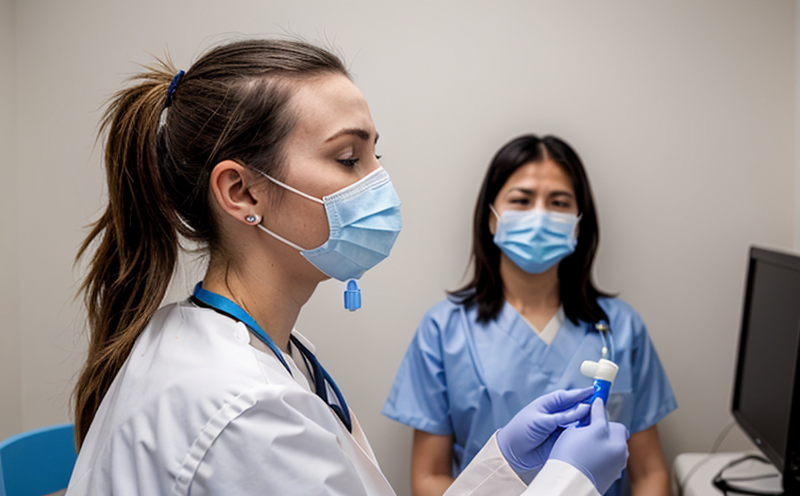Histophilus somni Respiratory Disease Testing in Cattle
Histophilus somni is a gram-negative coccobacillus that causes respiratory disease in cattle. This condition, commonly referred to as Histophilosis, can lead to significant economic losses for farmers and ranchers by causing high mortality rates and reduced productivity. Accurate diagnosis through reliable testing methods is crucial for effective treatment and prevention strategies.
The identification of Histophilus somni in cattle involves several stages including sample collection, transportation, preparation, culture, and biochemical analysis. Our laboratory offers comprehensive testing services to ensure precise results that guide appropriate medical interventions. This service supports both diagnostic purposes and research activities aimed at understanding the pathogenesis of Histophilosis.
In this service, we utilize advanced microbiological techniques such as Gram staining, antigen detection tests (like ELISA), and polymerase chain reaction (PCR) methods to detect Histophilus somni. The PCR method is particularly sensitive and specific, enabling us to identify even small quantities of the bacteria present in a sample. Our laboratory also employs serological testing which measures antibodies against Histophilus somni, providing indirect evidence of exposure or infection.
The importance of this testing cannot be overstated, especially when it comes to herd health management and biosecurity practices. By identifying infected animals early on, farmers can implement targeted treatments and quarantine protocols to prevent further spread within their herds. Additionally, understanding the prevalence of Histophilus somni in different regions helps us tailor our services to meet regional needs effectively.
The results from these tests are critical for making informed decisions about vaccination programs, breeding practices, and overall animal welfare initiatives. Properly conducted Histophilus somni testing ensures that affected animals receive prompt care while minimizing stress on the rest of the herd. It also plays a vital role in epidemiological studies aimed at controlling infectious diseases like Histophilosis.
Our commitment to excellence extends beyond just providing accurate test results; it includes offering timely feedback and support throughout the entire process. Our team works closely with clients to ensure they have all necessary information about their test outcomes so that appropriate actions can be taken promptly.
Scope and Methodology
The scope of our Histophilus somni testing service encompasses various aspects related to respiratory disease diagnosis in cattle. We cover the entire process from sample collection through final analysis, ensuring accuracy and reliability at every step.
| Step | Description |
|---|---|
| Sample Collection | Pulmonary tissue samples are collected aseptically using sterile swabs or needles. These specimens need to be kept cool during transport back to the laboratory. |
| Culture and Isolation | The samples undergo standard microbiological procedures for isolation of Histophilus somni. |
| Identification Techniques | We use a combination of conventional methods like Gram staining along with modern molecular techniques including PCR. |
| Antigen Detection Tests | To identify specific antigens associated with Histophilus somni. |
| Serological Testing | This involves measuring antibodies against the bacteria to assess past exposures or current infections. |
The methodology adheres strictly to international standards including ISO, ASTM, EN, and IEC guidelines. These stringent protocols ensure that our findings are consistent with global best practices.
Customer Impact and Satisfaction
Our Histophilus somni respiratory disease testing service has a direct impact on improving the health and productivity of cattle herds across various regions. Farmers benefit from reduced losses due to sickness, increased milk production, better meat quality, and improved overall herd performance.
The precision provided by our tests allows for early detection and treatment of infected animals, thereby preventing further spread within the herd. This proactive approach enhances biosecurity measures, reduces downtime associated with sick animals, and promotes sustainable farming practices.
Client satisfaction is a key priority for us. We strive to deliver quick turnaround times alongside accurate results that are backed by robust scientific evidence. Our clients appreciate our transparency regarding test procedures and results interpretation, fostering trust between us and our customers.
To ensure continuous improvement in service quality, we actively seek feedback from our users. Their input helps refine our processes further, ensuring that our offerings remain relevant and effective against evolving challenges faced by the agricultural sector.
International Acceptance and Recognition
- The World Organization for Animal Health (OIE) recognizes Histophilus somni as a notifiable disease.
- ISO/IEC 17025 accreditation ensures our laboratory meets high standards of technical competence in performing testing activities.
- American Society for Testing and Materials (ASTM) protocols are followed to maintain consistency and accuracy.
- The European Committee for Standardization (CEN) standards guide our approach towards ensuring compliance with international norms.
By adhering to these internationally accepted practices, we guarantee that the results from our Histophilus somni testing service will be recognized globally. This standardization not only enhances credibility but also facilitates effective communication among veterinary professionals worldwide.





